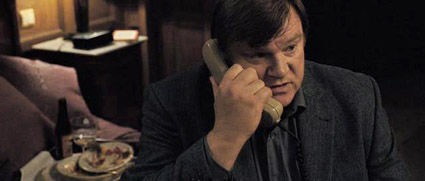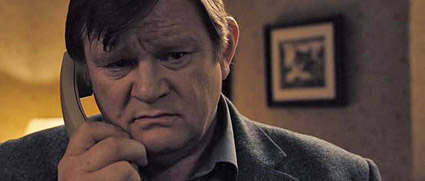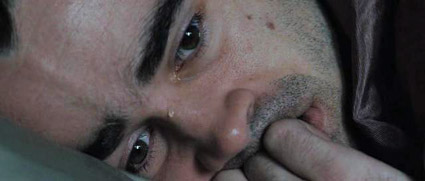When a great influential film comes out, we usually get a backlash of cheap knock-offs. After James Cameron’s “Titanic” we suffered through Michael Bay’s “Pearl Harbor.” When “Pulp Fiction” came out people praised its genius but its influence drove the genre to a creative blockage. Everybody wanted to be the next Tarantino. Directors probably asked themselves “What would Tarantino do?” before violating their own originality. Like most imitations, of Rolex watches or anything else, they look the same but don’t work the same.
With “In Bruges.” it feels like Martin McDonagh opened a window in a room where the air has been recycled endlessly. For his directional debut is a true work of originality. It strikes a balance between humor and drama and adds a rare layer of philosophical undertones to the genre. It has something new to say and so the experience is a rewarding one.
The films begins with Ray (Collin Farrell) and Ken (Brendan Gleeson) walking in Bruges, “the most well preserved medieval city in the whole of Belgium.” We quickly learn that both are hitmen who are hiding out. Bruges is the last place you would go to look for somebody. Heck, I never heard of this beautiful place before watching the film. Anyway, this is where where you stop reading if you haven’t seen this film yet.
Ken is the wiser of the two; he’s quiet, well mannered and smart. He is also fascinated by the old buildings, the architecture and the history of the city. Ray, on the other hand, is bored out of his wits. He can’t wait to go back to Dublin and is frustrated that he isn’t hiding out in London. We later learn that the reason they are hiding out is because Ray accidentally killed a young boy on his first job.
McDonagh says the inspiration to make the film came from when he was stranded in Bruges. He thought the city was beautiful with a fascinating history, but he couldn’t stand the boredom. This split opinion is what gave birth to both characters in writing and it is simply brilliant how their views differ on everything from life to death. “In Bruges” is one of those films instantly elevated to cult status through countless quotable lines. The one-liners don’t feel scripted, the delivery is hysterically natural.
The brilliant humor makes the film an easy read but if you look past the laughs, you’ll find a film rich with symbolism and ideas. Ray and Ken remind me of two characters from another Irish work of art, “Waiting for Godot.” Like Vladimir and Estragon they’re waiting for something. The wait is meant to be torturous, only they’re not waiting for Godot, they’re waiting for a phone call from Harry (Ralph Fiennes), their boss. The arrival of the phone call is the film’s climatic moment.
The scene comes in the form of a six minute long take. Ken is sitting in his hotel room and the famous opening shots of “Touch of Evil” can be seen on television in a nice reference. He answers the call and it’s Harry. After some humorous chit chat involving an imaginary Ray leaving the room to go bowling, Harry asks him if they’re having a good time. At first Ken answers him honestly saying that he is but it’s not really Ray’s cup of tea. A moment of silence later Harry flips out and shouts “How can a fairytale town not be somebody’s fucking thing?” Ken then retracts his words to save his friend. He even goes a step further as we see him smile and hear him making up a story involving Ray describing how he loves Bruges. “You know what he said to me the other day? I know I’m awake but it feels like I’m in a dream.” Harry buys it and cuts the chat by instructing him to kill Ray for what he’s done.
At the beginning of the film it looked as if Ken and Ray couldn’t stand one another, but by the time the phone call arrives their friendship has developed into brotherhood. Ken’s smile fades away and his face goes blank upon hearing the order. Afterward, Harry asks Ken to repeat to him what Ray said about the swans in Bruges. The words are the same but the delivery is different. The first time he said those words, there was humor in them, but now he actually means it. “I know I’m awake but it feels like I’m in a dream.” McDonagh’s original screenplay was deservedly nominated for an Academy Award.
I never thought I could sympathize with a child murderer. Even though the child’s death was an accident, it’s still extremely difficult to feel compassion and empathize with an adult who has committed such a terrible crime. What distinguishes Ray from psychopaths is the fact that he doesn’t attempt to rationalize his sins. Instead, he plunges into a state of depression and a torturous emotional experience, guilt. He knows he violated moral standard and understands that only punishment might cure his guilt. In a touching scene that demonstrates Farrell’s true acting ability he wipes off tears from his eyes and says “He’s dead because of me. And I’m trying to… been trying to get me head around it, but I can’t. I will have always have killed that little boy. That ain’t ever going away. Ever. Unless… maybe I go away.”

The characters in this movie are as human and fully fleshed out as it gets. McDonagh is a student of human nature, his writing is sublime. Ray occasionally seems like he’s happy. For the briefest of moments you see him laugh smile or enjoy himself but then guilt pulls him back to his depressive state. Before going out on a date he looks at himself in the mirror. A sad facial expression forms as he studies himself. It almost looks like Ray doesn’t think he deserve to enjoy this night. After a wild night involving hookers, booze, and cocaine, he wakes up the next morning sunken into misery. Laying in his bed a tear slowly forms in the corner of his eye and trickles across his face.
I can’t imagine how it must feel to carry guilt of this magnitude around every second of one’s life. Imagine the guiltiest you’ve felt in your life and multiply that by a hundred. That’s what it does to you. It eclipses your life as you know it, paralyzing and putting a stop to everyday pleasures. Eventually, nothing is left but a single desire. Ray is left with a choice; he can either continue living this devastating life or put an end to it. Ray chooses the latter. That very morning he gives all the money he has left to the pregnant receptionist and sits in front of a playground to feed his guilt, sink deeper into depression and find courage to commit the inevitable.
“In Bruges” is a film that evokes the feeling of guilt better than most motion pictures. It knows that it brings out the humanity in us and recognizes that guilt can drive us to the darkest corners of the mind. Each time I watch this film I ask myself the same questions. Is punishment the solution to getting rid of guilt? Can guilt change us for the better? If so, wouldn’t it be a form of rehabilitation? Does Ray really deserve to die for what he has done?
That last question is the conflict that turns two friends against one another. Both Harry and Ken have different principles and are dedicated to what they believe in. Harry believes Ray should die and Ken believes he has the capacity to change and deserves a second chance. I couldn’t help but admire how McDonagh put Ray’s life in the hands of both of these wise characters. It’s almost as if Ray doesn’t have a say in this, he even fails to take his own life. Ken is his guardian angel, Harry is a grim reaper like figure seeking justice and all three are in purgatory.
For some reason the idea of waiting for judgment in an unknown land is a common theme in philosophical Irish literature. Like in “Waiting for Godot” these characters are in a place they’re not familiar with and all three are waiting for the moment of truth. Bruges is symbolic of purgatory. They’re trapped in the city waiting for their inevitable fate. This is hinted upon several times during the film.
When Ray and Ken visit a museum they stumble upon “The Last Judgment” painting by Hieronymous Bosch. “Purgatory’s kind of like the in-betweeny one. You weren’t really shit, but you weren’t all that great either.” Notice how similar Bruges is portrayed throughout the picture. On the one hand it’s a “fairytale town.” On the other it’s a shit-hole. Maybe it’s in-betweeny.
Fiennes never fails to mesmerize me in villainous roles. His portrayal of Harry is so different from the iconic Voldemort in “Harry Potter” and the ruthless Amon Goeth in “Schindler’s List.” Here he’s like a loaded gun always a tick away from losing it, but he’s also an honorable family man with principles. Ken’s death is more ironic. After constantly convincing Ray not to commit suicide, he jumps off a tower, only he does it to save Ray’s life. It’s too late to save himself but here’s still a chance to die doing one last good deed. When his body splashes all over the sidewalk, Ray rushes to him and cries upon realizing it’s his friend. “Take me gun,” he utters. I’ve seen thousands of people dying in a lot of movies, but I’ve never quite see anyone capture that last moment as perfectly as Gleeson does here. Notice his eyes. They stare, struggle to roll, and then return to their original position, the pupils dilate and all his facial muscles relax instantaneously. Gleeson’s acting is Oscar worthy. As for Ray, we never find out what happens to him. He walks into a surreal filming location that resembles the Bosch painting we’ve seen earlier and gets shot several times before dropping to the ground.
It’s an open ending and you can look at it either way. I know that the last shot is fixed on bright neon lights in the ambulance and then the screen fades to black. I’m sure this was a symbolic choice but viewers who complain about the open ending miss the point of the movie. For me, “In Bruges” is one of those rare movies that end at the perfect moment. One can easily miss the real conclusion here. It’s not whether Ray lives or dies. The last words of narration are as follows, “I really really hoped I wouldn’t die I really really hoped I wouldn’t die.” Ray is no longer suicidal and finally found the will to live. That is what’s important here, Ken didn’t die for a lost cause.

















A great review, as always, Wael. I hope we’ll see posts from you more regularly now 🙂 And, of course, I must thank you for turning me onto this movie sooner rather than later.
LikeLike
Mr Khairy,
I must say you are entirely spot on. I read your review after watching the movie. I’ve been affixed with it. This is definitely one show worth watching again. Everything you mentioned, I second you to all of them. Reading your review reminded me of the great moments in the movie. Like how gleeson rolled his eyes and how the pupils moved. Thanks
LikeLike
Thank you, Tommy. Much appreciated. “In Bruges” is one of the most rewatchable films I’ve ever seen. I’ve seen it countless times and still feel the urge to revisit this dark gothic fairy tale like movie.
LikeLike
Will you be reviewing The Hunger Games?
LikeLike
I should yes.
LikeLike
In-depth, nice comparison to ‘Waiting for Godot’.
I very much enjoyed reading your review.
Greetings from Belgium.
LikeLike
Fantastic analysis, made my friends read it after they watched the movie. It hadn’t struck me that the final dialogue IS the resolve.
Thanks.
LikeLike
Thank you!
LikeLike
Just an add on: Much like the way Ray accidentally killed a child on his assignment, which sets the plot for the entire movie, Harry upon shooting Ray in the end of the movie accidentally kills a dwarf actor on the movie set. Thinking that this was a child Harry proceeds to commit suicide right then and there adhering to a principle he earlier stated to Ken that if he killed a child he would have no choice but to kill himself. It’s just that perfect irony that leaves you saying holy crap in the end of an already GREAT movie
LikeLike
To add to the irony, when Harry buys the gun from Yuri, which is a hilarious scene in itself, Yuri offers Harry a box of dum-dums, bullets that make the head explode. Upon taking the box, Harry says, “I know I shouldn’t, but I will” and proceeds to take the entire box. — Furthermore, in that final scene, in Bruges/Purgatory, on the set of the movie which is symbolic of The Judgement Day painting, Ray tries to stop Harry from killing himself because the child he thought he killed was actually a dwarf. Ray does the right thing, despite Harry trying to kill him a second ago. This is Ray’s redemption. That’s when he overcomes his guilt, that’s when he realizes he wants to live, and that’s when we see the white lights before the film ends.
LikeLike
Wow. Way to COMPLETELY copy and paste Roger Ebert’s analysis of this film.
LikeLike
I’m Roger Ebert’s foreign correspondent. I wrote the analysis on his site. At the top of my analysis posted on his page, you’ll find that “Wael Khairy in Cairo” is credited to have written it. I’m Roger’s correspondent which means I get to write analyst and reviews and have them featured on his website. Anyway, you can go check for yourself: http://blogs.suntimes.com/foreignc/2011/07/somewhere-between-heaven-and-hell.html
Get your info straight before going around accusing people of things they did not do.
LikeLike
Reading this was almost as great as the movie.
LikeLike
Thank you so much for those lovely words.
LikeLike
I’m still trying to understand how so many came to love this film, when I was only ever disgusted and dismayed by it. I kept waiting for the interesting bits to happen. Your review is masterful and well-reasoned, but it’s as though you’re describing a completely different film. I simply never connected with any part of it, and I cannot say why. I’d rather watch Accidental Tourist, or even Sunshine, a thousand times rather than see In Bruges even once more… but why?
LikeLike
Definitely if you encourage a high quality go well with, likes to be sure that the total deal is perfectly collectively. Give them your card so that they can call you individually if they operate into problems on the net. The on line buying solution is this: designers tend to create wardrobe collections that work with each other.
LikeLike
I’m very worthwhile in this subject hope you may sophisticated more on this later on posts
LikeLike
I for one, need to see this film again. It is very provocative with its questions, and it was amazing to see some analysis laid out like that. I think I also missed the humour, it was extremely brutal in its message. I felt like breaking down in tears when Ray does that speech about the boy that he killed.
LikeLike
I have spent days looking through everything I can find and still have not been able to locate the designer of the shirt Ray wore in that movie. Might you have any areas to point me in ?
LikeLike
Watched this film last night for the first time, and have been re-visiting it today through reviews online- yours is the best I have read.
LikeLike
Thank you so much for your kind words.
LikeLike
i did got the little things i might’ve missed out during the movie through this review. However, the one question i wanted an answer for, really skeptic one was why did ray want to stop harry from shooting himself? was the kid who’s head harry blew off unreal? as in part of the film that was being shot there? why would he want to stop harry from killing himself?
other thing harry sounded sort of crazy to me. He was too obsessed with his principles. He didn’t care for the fact that he will get arrested for shooting someone in front of everyone. He could’ve asked Yuri to kill ray and ken both but he went to bruges himself to do it. To say something is different but to do it is completely another case. But he really did walk the walk, as in shot himself like he said to ken earlier.
and another thing thekla reuten was gorgeous in the movie. I just didn’t get her smile at the end when ray was being carried on a stretcher.
LikeLike
The kid harry shot was actually not a kid, but a dwarf, which would’ve been visible from the persons facial features, if harry hadn’t picked dum-dums as his ammunition, which allegedly make the head explode. Harry didn’t have to kill himself here, because his principle only adheres to children, which is why ray tries to stop him.
LikeLike
i did got the little things i might’ve missed out during the movie through this review. However, the one question i wanted an answer for, really skeptic one was why did ray want to stop harry from shooting himself? was the kid who’s head harry blew off unreal? as in part of the film that was being shot there? why would he want to stop harry from killing himself?
other thing harry sounded sort of demented to me. He was too obsessed with his principles. He didn’t care for the fact that he will get arrested for shooting someone in front of everyone. He could’ve asked Yuri to kill ray and ken both but he went to bruges himself to do it. To say something is different but to do it is completely another case. But he really did walk the walk, as in shot himself like he said to ken earlier.
and another thing thekla reuten was gorgeous in the movie. I just didn’t get her smile at the end when ray was being carried on a stretcher.
LikeLike
Wow. What a review. I am speechless as to how much this relates directly to my thoughts of the movie. You hit every note spot on! Great review, and a fantastic film. It is hard to explain to people who refuse understand it but all that matters is that I understand it. To me, in a way, Seven Psychopaths is a sequel to In Bruges being that Martin McDonagh is Marty, the main character, exclaiming his desire to tell a heartfelt story underneath all the dark violence. I think both his films relate to literature as well, such as the philosophies of Hawthorne and Emerson. This movie is in my top 5 of all time.
LikeLike
Interesting theory on “Seven Psychopaths”…like “In Bruges” at first I wasn’t sure if I liked the film or not, but with subsequent viewing it grew on me. McDonagh films are like great wine…they age well.
LikeLike
Thank you for verbalizing the reasons why I love this movie in a coherent manner. I have watched this movie over a dozen times, and could never completely rationalize why I consider this to be my favorite movie. Your input is greatly appreciated.
Wonderfully written, and an insightful review!
LikeLike
Reblogged this on Reflective Meadows and commented:
Great analysis of an underrated movie!
LikeLike
Great analysis! It added very much to me. Thank you!
LikeLike
Reblogged this on lawdr2006.
LikeLike
great review. i was, however, trying to find out if anyone else thought, “the little boy”, that the priest was referring to was not the child who was killed, but that harry was “the little boy”, (the last happy holiday he had was when he was in Bruges when he was seven.), who had been hurt by him.
that seemed to me the basis for harry stating that if he hurt a child he would kill himself. the reason for the priest death not being articulated leaves it open to interpretation, but seems to point in that direction in my mind at least.
LikeLike